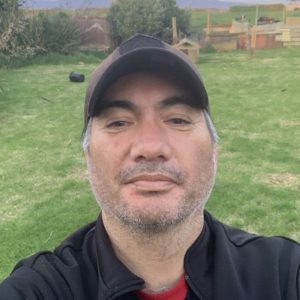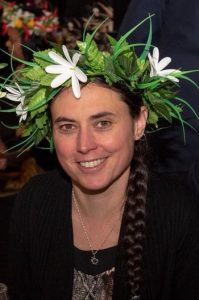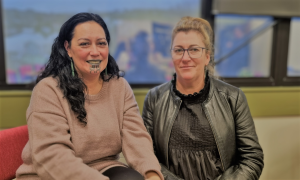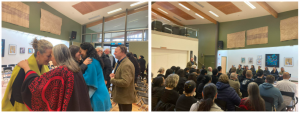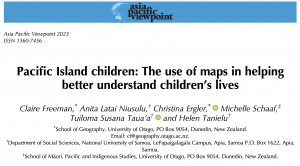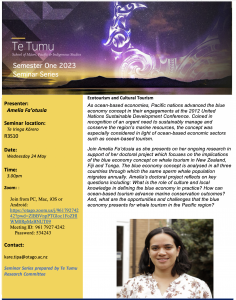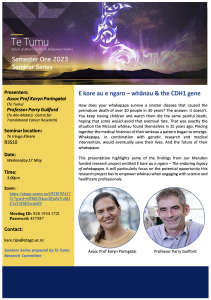Kei whea te wāhi ki a Rongo?
To celebrate Te Wiki o te Reo Māori, the Te Tumu Research Committee is showcasing the exceptional work of Māori postgraduate students writing their theses in te reo. Roma Donaldson-Gush talked to Tonga Karena, and asked him to share some insights about his rangahau.
Hei whakamana i tō tātou reo Māori, kua kōrero atu a Roma Donalson-Gush ki ētahi o ngā tauira Māori e tuhi ana i ā rātou ake tuhinga roa (Tohu Paerua, Tohu Kairangi rānei) i te reo Māori. Ia rā o te wiki nei, ka whakaatu ai tētahi o aua tauira, i tēnei rā, ko Tonga Karena tērā.
He tauira a Tonga nō Te Tumu me Te Ao o Rongomaraeroa (Peace and Conflict). Ko te pūtake o tōna mahi rangahau, he rapu i ngā kōrero mō Rongo a te Māori, i mua i te taenga mai o te paipera me te rongopai, me te rapua mai he aha rawa ērā āhuatanga i roto i tōna ake iwi o Taranaki. Kei te aro hoki ia ki a Parihaka me ngā āhuatanga o Rongo ki reira – e kīia nei, ko ngā kura huna. He nui nga tūmomo kōrero e whakatairanga nei i te rongopai ki roto i a Parihaka. Ko tōna hiahia ki te rapu whakautu mō te pātai, kei hea te wāhi ki a Rongo?
Nā te aha koe i whiriwhiri i tēnei huarahi ki te tuhi i tō tuhinga whakapae i roto i te reo Māori?
“I timata taku tuhi i tēnei tuhingaroa ki roto i te reo Pākehā. Ka tae atu au ki waenganui o te mahi, ka tahuri mai ngā kaitiaki me te pātai, ‘pēhea rānei ki a koe tō tuhia mai i tō rangahau ki roto i te reo?’ I āhua ohorere au i tēnā pātai, engari he pai ki a au nā te mea, he timatanga tēnei mā Parihaka ki te kōrero ki a ia anō ki roto i tōna anō reo. Ko te mea kē, kia rongo i a Parihaka tōna anō reo – me whai reo a Parihaka ki roto i tōna reo Māori. Koirā tāku i ngākaunui ai ki tērā huarahi tuhituhi.
“Ko tōku tino pātai i a au e tuhi ana ki roto i te reo Pākehā, ‘He aha ai au e whakaratarata nei i te ao Pākehā ki ēnei kōrero?’ Ka mutu, me whai wāhi ngā tauheke ki te māhorahora mai, ki te ruku hohonu atu ki roto i tō rātou ngākau, mamae kore nei. Ka māmā ko te maringi mai o ngā kōrero i ngā tauheke e mārama ana ki te reo. Ka mutu, he tino taonga te pānui i ngā kōrero o tō iwi, o tō hapū i roto i tō reo.”
He aha ngā āhuatanga matua, ngā hua me kī, kua puta i tō kōwhiringa ki te tuhi i roto i te reo Māori?
“Kua nui ake taku mōhio ki tōku Parihakatanga. Kua whai wāhi au ki te takahi tētahi huarahi e rapu ai au te mea ngaro – te kura. Ka mutu, ko te kukume mai o te kāinga i a koe kia noho tahi koe me ō pāhake, me te hapori whānui.”
He kupu tohutohu, he kupu akiaki rānei āu mō ngā tauira e hiahia ana ki te whai rangahau i roto i te reo Māori?
“Me manawanui koe ki a koe anō. Me manawanui koe ki te noho tahi me o pāhake, ki te pānui pukapuka, ki te wero i ngā kōrero a ngā Pākehā i tuhi ai mōu. Kimihia tō reo tuhituhi, kimihia tō reo kōrero. Ka haere ngā tau, ka pahure ngā tau i a koe, ka kite koe he tangata hou kua puawai mai. I te mutunga iho, ka kite koe i tētahi mea, i tētahi kura, hei tuku atu ki te ao.”
Kia kaha te reo Māori
To celebrate Te Wiki o te Reo Māori, Te Tumu Research Committee is showcasing the exceptional work of Māori postgraduate students writing their theses in te reo Māori. Roma Donaldson-Gush talked to Kahurangi Tipene, and asked her to share some insights about her rangahau.
Kia kaha te reo Māori te kaupapa matua o tēnei wiki. Hei whakamana i tō tātou reo Māori, kua kōrero atu a Roma Donalson-Gush ki ētahi o ngā tauira Māori e tuhi ana i ā rātou ake tuhinga roa (Tohu Paerua, Tohu Kairangi rānei) i te reo Māori. Ia rā o te wiki nei, ka whakaatu ai tētahi o aua tauira, i tēnei rā, ko Kahurangi Tipene tērā.
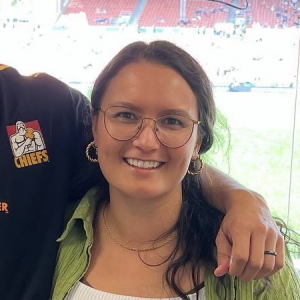
Ko Kahurangi Tipene, Nō Waikato me Ngāpuhi
E mahi ana a Kahurangi i tana Tohu Kairangi, ā, he tauira ia nō Te Tumu me te Pūtaiao. Ko te tino pūtake o tōna ake rangahau, he waha ake i ngā wheako a tētahi whānau i Tauranga e mau nei i tētahi irakē. Ka mutu, ko tāna tūponotanga ka whanake mai ai te mate pukupuku puku, me te mate pukupuku uma. Ko ia hei māngai mā te iwi irakē.
Nā te aha koe i whiriwhiri ai i tēnei huarahi ki te tuhi i tō tuhinga whakapae i roto i te reo Māori?
“He pai ake mooku te tuhi me te whakaputu i ngaku whakaaro, koorero, wairua ki te reo Maaori. Nooku i te koohanga, kura kaupapa, wharekura i poipoi i taku reo Maaori.”
He aha ngā āhuatanga matua, ngā hua me kī, kua puta i tō kōwhiringa ki te tuhi i roto i te reo Māori?
“Ko ngaa hua ka puta i tooku koowhiringa ki te tuhi i roto i te reo Maaori, kia puta pai ai he rauemi maa taatou te iwi Maaori, maa ngaa whaanau Maaori hoki, kia whakaako ai raatou i ngaa aahuatanga katoa o te irakee. Ka mutu, he tohu kia whakakipakipa i te hunga e mataku ana ki te tuhi i te reo Maaori. Anei, he tauira teenei maa koutou.”
He kupu tohutohu, he kupu akiaki rānei āu mō ngā tauira e hiahia ana ki te whai rangahau i roto i te reo Māori?
“Kei ngaa ika aa whiro o te reo Maaori, koutou e kaingaakau ana ki te reo Maaori, teenaa whiua ki te ao. Kia kaha te tuhi me te koorero i te reo Maaori, ahakoa hapa mai, aha mai. Mirimiri atu ki ngaa pokowhiwhi o tauira kee e manawanui ana ki te reo Maaori. Ka taea e koutou.”
Te reo Māori o ngā Kūki ‘Āirani: Dr Akevai Nicholas
Earlier in the week Te Tumu hosted a visiting scholar from the University of Auckland, Dr Akevai Nicholas. Akevai is from the island of Ma‘uke (Cook Islands) and is a Senior lecturer in Māori studies at the University of Auckland. She has a linguistics and Māori Studies background and her research focuses on the description, documentation, and revitalisation of her ancestral language.
Staff and students of Te Tumu, and the wider University community, were fortunate to meet and engage in a rich and insightful kōrero with Akevai. Informal in nature, the discussion and questions from those present kept rolling in and Akevai’s knowledge and expertise in the area of linguistics associated with te reo Māori o konei me ngā Kūki ‘Āirani was notable. A sobering point of discussion was the worryingly low proportion of Cook Islands Māori speakers in Aotearoa and the home island, it is a language that is very much in critical need of revitalisation and initiatives to teach the youth their language, sometimes alongside their parents. There is no denying a connection between Māori of Aotearoa and Māori of Kūki ‘Airani, genealogically, culturally and linguistically, therefore, a call to support and work together to achieve their reo aspirations is needed.
Some of the other key messages and kaupapa discussed included intergenerational language transmission, the geography and demography of the speaking populations, the introduction and interaction with English speaking people and some key researchers and leaders in linguistics of Indigenous Polynesian languages from the 1960’s to now. It was not difficult to hear the impact Dr Akevai Nicholas is making with her research, a trail blazer, a strong advocate and a passionate Ma‘ukean, who is a crucial champion of and for the revitalisation of te reo Māori o ngā Kūki ‘Āirani and te reo Māori Aotearoa. Meitaki nui Dr Akevai Nicholas.
“Reinstating Mana Whenua narratives back on the whenua”: Te Tumu Seminar series guest Megan Potiki
In a thought-provoking and timely session given the ongoing celebrations of Matariki, Kāi Tahu and Te Ātiawa academic Megan Potiki presented as part of the 2023 Te Tumu Seminar Series on Wednesday this week. Her talk centred around the work of creating mana whenua narratives for various building and development sites around the city and the wider Ōtakou region. This includes work for puna kaukau, the police station, the hospital, George St, the university re-brand, Auahi Ora – Union, and Tunnel Beach. She’s also been part of the Te Rangihīroa student accommodation build in collaboration with Ngāti Mutunga of Taranaki.
Megan’s characteristic humour and honesty about the process of creating these narratives was both refreshing and profound. She stressed the importance of “getting it right with your own people”, being able to own your mistakes, and putting in the work to finding multiple credible sources. It’s also important to know when to give, when to take people with you and when to push for change. There is both privilege and responsibility that comes with being able to grow up living and learning from your own whenua and also for those who return to their roots.
Ultimately, Megan’s talk high-lighted the importance of bringing to life stories that are deeply rooted in the knowledge, practices and people of this whenua. The process of writing a narrative is complex, requiring a lot of research, collaboration, and hard work particularly when collaborating with your own hāpu. Names have power, and reinstating the mana associated with those names is vital in redressing some of the mamae caused by colonisation, and also celebrating the wealth and wisdom of generations that have come before us.
Early career Cook Island researchers shine at the Pacific Islands Universities Network Conference 2023 ki Rarotonga
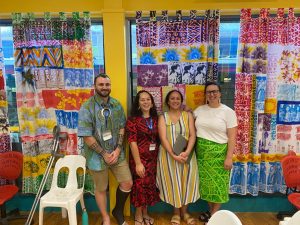
L-R: Cook Islands scholars Liam Koka’ua, Inano Taripo Walter, Dr Emma Powell, Stacey Koka’ua Balfour
Dr Emma Powell writes about her recent trip to Rarotonga for the 2023 Pacific Islands Universities Network Conference.
Established in 2012, the Pacific Islands Universities Network (PIURN) Conference was intended to “enable closer and meaningful collaboration” amongst a consortium of 14 universities located in the island-Pacific. Rarotonga was chosen as the location for the networks 5th meeting and several doctoral students and Otago staff travelled to the Cook Islands to participate in the regional conference on 4-6 July 2023.
Dr Emma Powell arranged a special session for Cook Islands early career researchers on 6 July local time. Inspired by the arrangement of a festschrift for Cook Islands scholar and educator, the late Dr Marjorie Crocombe, during the conference, the session was intended to honour an pioneering generation of scholars, many of whom were mentored by Dr Crocombe, and signal new turns in Cook Islands scholarship from a swelling critical mass of new Cook Islands researchers.
Inano Taripo Walter, who is a Cook Islands doctoral candidate with secondary supervision at Te Tumu, presented on the role of va‘ine Māori within the land court. She discussed the importance of piri‘anga (relationships), ‘akapapa‘anga (genealogies) and mana to understanding the significance of women in the arbitration of ‘enua (land) within Cook Islands society. Stacey Kokaua, a Cook Islands doctoral candidate in Otago’s English department, presented her early stages of research into Cook Islands Māori theoretical responses to ecocriticsm within literary studies. Liam Kokaua, a graduate of the University of Auckland’s Masters of Indigenous Studies programme, shared compelling research he’d undertaken about the pae maunga on Rarotonga. Liam has produced material for screen and a book that makes accessible ancient and new knowledge about tupuna maunga in the Cook Islands.
The session was well-attended by other Cook Islands and Pacific delegates. The Q&A session was engaging and the panel received an overwhelming number of questions and comments that showed enthuasism both for their respective projects and the wider project of Cook Islands scholarship.
Unexpectedly and with sadness, the session seemed even more poignant with the surprise passing of legendary Cook Islands scholar, musician, writer and public servant, Professor Jon Jonassen, on the first day of the PIURN Conference. Professor Jonassen was widely acknowledged as an expert on Cook Islands peu Māori (cultural traditions), tua ta‘ito (ancients stories) and the Cook Islands drumming tradition. His passing during the conference was a shock to many attending and was felt sharply during the session.
Acknowledgements must also go to Univeristy of Otago colleagues who presented at the conference: Dr Moira Fortin Cornejo (Languages and Cultures) and Dr Jesse Kokaua & Dr Troy Ruhe (Va‘a o Tautai). Dr Powell also presented at the festschrift session for Dr Crocombe where she spoke to a brief paper titled: “That we may be proud of our heritage”, Marjorie Crocombe & Pacific Literature.
Te Poroāki o Lachy Paterson & te Pōhiri o Roma Donaldson-Gush
Last week Te Tumu celebrated well with the retirement of Emeritus Professor Lachy Paterson and the arrival of new Māori Studies pūkenga, Roma Donaldson-Gush. Roma, of Ngāti Porou, Taranaki, Ngāti Tūwharetoa, Kotirana descent, joins Te Tumu staff with a background in bilingualism and intergenerational language and culture transmission for Māori. Roma will be completing her PhD studies as well as teaching into the Māori Studies programme. She is a Te Tumu alumnus having previously completed postgraduate study looking at Te Reo Māori in urban New Zealand. The pōhiri, held on Wednesday 28 June, included representatives from Office of Māori Development, Te Huka Mātauraka, Te Rōpū Māori, staff from Te Tumu and the wider university. Roma was supported by her whānau, colleagues, and friends in a day filled with the celebration of new relationships and excitement for the future of Te Tumu.
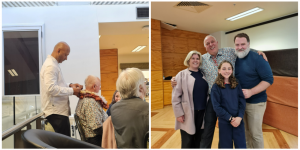
L: Dean of Te Tumu Patrick Vakaoti garlanding Lachy with a salusalu. R: Angela Wanhalla, Lachy Paterson and whānau
Ara mai he tētēkura, wehe atu he tētēkura. With a new frond beginning, a mature frond leaves.
With over 16 years of service as a teacher, mentor, friend, and conspirator, Lachy Paterson was farewelled in an intimate gathering of colleagues and whānau on Friday 30 June. Many spoke of the contributions Lachy has made to Māori Studies, Te Tumu and the university as a whole with several teaching, administration and leadership roles. Stories unfolded about his days as a student, teaching fellow and ultimately his unrelenting commitment to Te Tumu. Although it was a bittersweet day, Te Tumu looks forward to a continuing relationship with Lachy as an emeritus professor and eagerly await his future publications and foray into YouTube.
Re-visioning Pacific research method/ologies in the new issue of Waka Kuaka (Journal of the Polynesian Society)
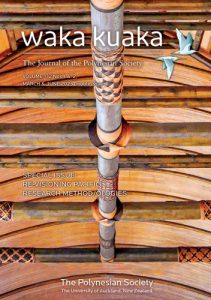
The beautiful lalava (lashings) created by Sopolemelama Filipe Tohi in the Fale Pasifika at the University of Auckland. (Picture by Julia Mageau Gray.) Click image to enlarge.
The Journal of the Polynesian Society has renewed its branding with the addition of its new name, Waka Kuaka. In the second issue, and first special issue under its new title, co-editors Dr Marcia Leenen-Young and Dr Lisa Uperesa of the University of Auckland gathered doctoral candidates and early career Pacific scholars from across Aotearoa, Te Waipounamu and Australia under the theme Re-Visioning Pacific Research Method/ologies. Three of our Te Tumu whānau were involved in the project. Dr Emma Powell and PhD candidate, Wanda Ieremia-Allan were both authors in the issue with their respective articles, “Tei te Akau Roa: An Ocean of Metaphor in Pacific Research Methodologies” and “Feiloa‘iga ma Talanoaga ma ‘āiga: Talanoa with Family in the Archives”. Professor Michael Reilly, a long-time member and supporter of the journal and society, also generously gave his feedback on Leenen-Young and Uperesa’s introduction.
In the words of the co-editors, the issue marks an “…historic shift in research practice and approaches for and by Pacific peoples and is intended to contribute new knowledge about how Pacific research methodologies and methods are being used (alone and in conjunction with other research approaches and methods). The contributions in [the] special issue help to illuminate the mutually constitutive relationship between theory and practice by sharing critical reflections and practical adaptations by early-career researchers who are raising considerations appropriate for the contemporary moment. In building on current knowledge, some deepen our understanding while others elaborate new approaches” (12).
The issue provided an opportunity for early career Pacific scholars to publish in an iconic journal of anthropology and related scholarly fields dedicated to Polynesia and the wider Pacific region. As a part of the issue’s production, the editors facilitated an innovative development and peer review process that was fully funded. The development of the special issue involved an online writing retreat, weekly 2.5 hour online writing sessions prior to draft submission, and a 1.5-day compulsory, in-person closed symposium for a double peer-review process. This was held at the Fale Pasifika in Auckland as was the launch of the issue which was held on 12 June 2023.
Collaborative Pacific research across schools and universities
It is great to see collaborative Pacific research by scholars across Otago’s schools and universities.The latest is a journal article in Asia Pacific Viewpoint featuring Te Tumu’s Dr Michelle Schaff, along with academic staff from the School of Geography and National University of Samoa on the use of maps in helping better understand Pacific children’s lives. Click here to view this open access article.
Abstract
Children’s voices have been little heard in the Pacific research. The United Nations Convention on the Rights of the Child 1989 asserts the child’s right to have a say on matters that affect them and for their views to be considered. There has been massive growth in technologically assisted participative research; however, we argue the value of hand drawn maps should not be underestimated in the rush to engage with more advanced techniques. We present data from 267 neighbourhood maps drawn by children in Fiji, Kiribati, Samoa and New Zealand. To better understand the social construction of knowledge in children’s everyday lives, we propose two models to conceptualise the complexity of their world, a social connection and a spatial connection model. These models reveal how Pacific Island children negotiate different levels of social connection from home, family, and community through to transnational kinship relations. People, specifically family, provide the geographic basis on which their spatial encounters are overlaid. Irrespective of country or rural/urban/atoll setting, it is social space that is the strongest connector for children as displayed in their maps. Application of our models can be used to reveal how knowledge is socially constructed in Pacific children’s everyday lives.
Seminar: Ecotourism and Cultural Tourism
Amelia Fa’otusia, a PhD candidate at Australia National University, is currently in New Zealand undertaking research on whale tourism, as part of a wider comparison with similar ventures in Fiji and Tonga, and has kindly agreed to give a seminar to Te Tumu on “Ecotourism and Cultural Tourism”.
Amelia’s seminar will be in Te Iringa Kōrero (R3S10, 3rd floor of Te Tumu) at 3pm (NZ Time), on Wednesday 24 May.
This will also be available via Zoom. Click here to enter the Zoom Room.
Meeting ID 961 7927 4242
Password 534243
All interested people are most welcome to attend.
Please click on the poster for more information,
Seminar: E kore au e ngaro – whānau & the CDH1 gene
Assoc Professor Karyn Paringatai of Te Tumu has been collaborating with Professor Parry Guilford of Te Aho Matatū – Centre for Relational Cancer Research in a Marsden-funded project on the impact on Māori whānau of the CDH1 gene, a condition with a high risk of stomach cancer.
Come along to the next Te Tumu seminar to hear how Humanities and the Health Sciences have been working together to create positive outcomes for Māori whānau.
When and where? At 3.00pm in Te Iringa Kōrero (third floor of Te Tumu), Wednesday 18 May.
People can also “attend” via Zoom. Click here to enter the Zoom room. Meeting ID: 928 1934 1721 Password: 457587.
Click on the poster for more info. All Interested people are most welcome to attend.

